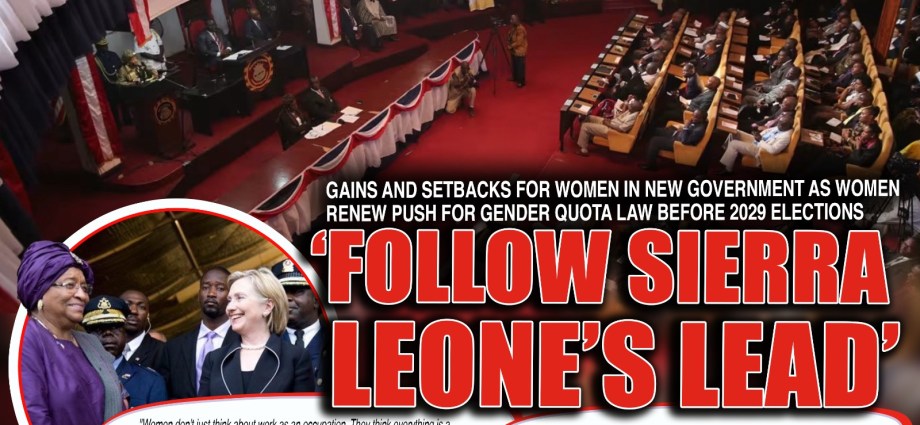Liberia: Gains and Setbacks for Women in New Government As Women Renew Push for Gender Quota Law Before 2029 Elections
Historic Cabinet Representation, But Legislative Progress Lags
MONROVIA, Liberia—President Joseph Boakai marked a milestone in his January State of the Nation Address, announcing that 39% of his cabinet ministers (7 out of 19) are women—the highest ratio in Liberia’s history. While advocates celebrated this achievement in executive appointments, concerns remain about women’s declining representation in the Legislature.

Rosana Schaack, former River Cess County representative, warned: “The real seat of power in Liberia remains out of reach for women.” Recent elections saw women win just 10.7% of legislative seats—lower than 20 years ago and far below the 27% sub-Saharan African average.
The Legislature: Where Real Change Happens
Atty Mmonbeydo Joah of the Organization for Women and Children emphasized: “The Legislature is where decisions affecting women’s lives are made. With equal representation, Liberia would benefit from both men’s and women’s perspectives.”
This paradox—strong executive representation but weak legislative presence—dates back to Ellen Johnson Sirleaf’s presidency (2006-2018). Though Africa’s first elected female president appointed women to 28% of cabinet posts, legislative gains didn’t follow.

Failed Quota Law and the Sierra Leone Example
Liberia’s struggle contrasts with regional progress. Rwanda leads Africa with 61.3% women in parliament, while Sierra Leone jumped to 28% after passing its 2022 Gender Empowerment Act. Liberia’s similar 2022 bill—which would have mandated 30% female candidates—failed under disputed circumstances.
Charlyne Brumskine, former vice-presidential candidate, urged President Boakai to prioritize passing the quota law: “We need at least 40% female participation in elected and appointed positions for national progress.”

Financial and Psychological Barriers
Campaign costs present major obstacles:
- $2,500 filing fee for independent presidential candidates
- $10,000 minimum bank balance requirement
- Average annual income near $500
Victoria Koiquah, who won 50,000 votes in Montserrado County’s 2023 senatorial race, described the financial challenges: “Sometimes women complete all processes but can’t afford poll watchers.”

Building Support Systems
Organizations are addressing these challenges through:
- Leadership training programs
- Legal support against political violence
- Mentorship initiatives
The Liberty Party recently achieved 50% female leadership. Chairperson Rugie Barry pledged: “We’ll continue championing policies that uplift women, as national progress depends on women’s progress.”
As Brumskine noted: “Nobody’s coming to save us. We must find innovative ways to overcome these challenges together.”
This story was produced in collaboration with New Narratives through the “Investigating Liberia” project, with funding from the Swedish Embassy. The funder had no editorial influence.


